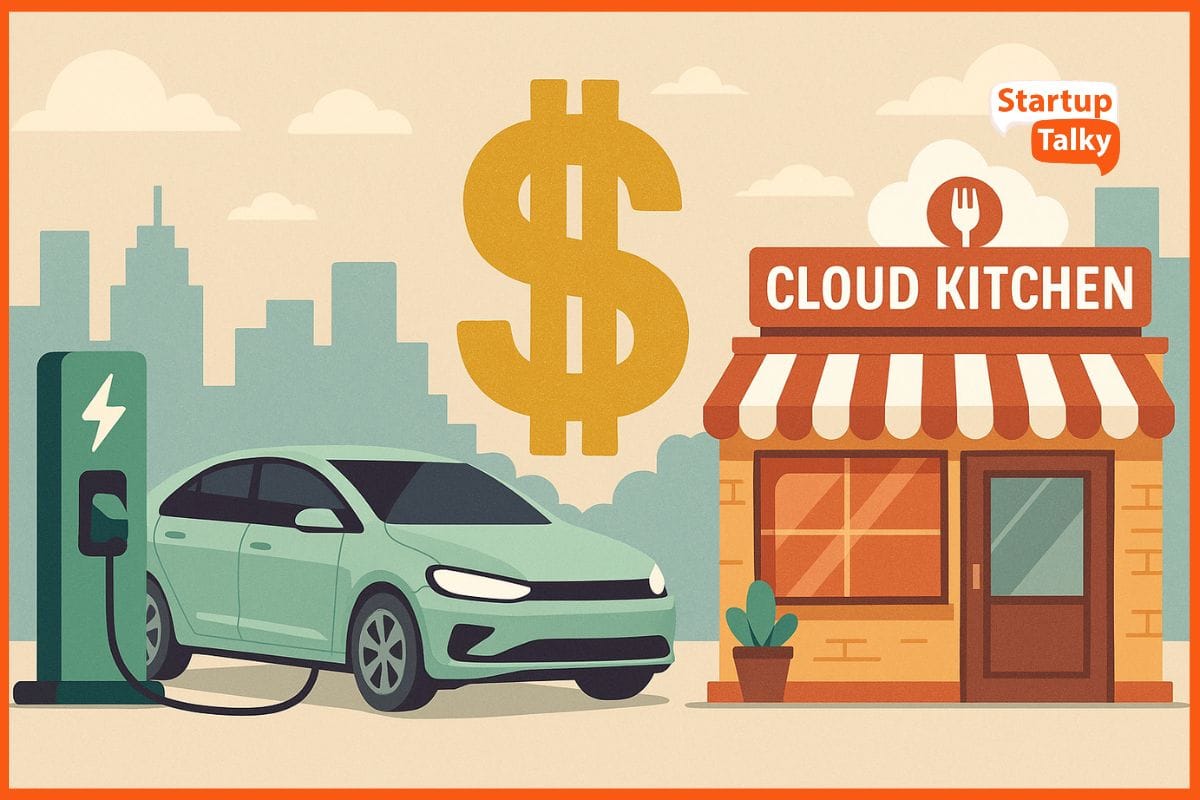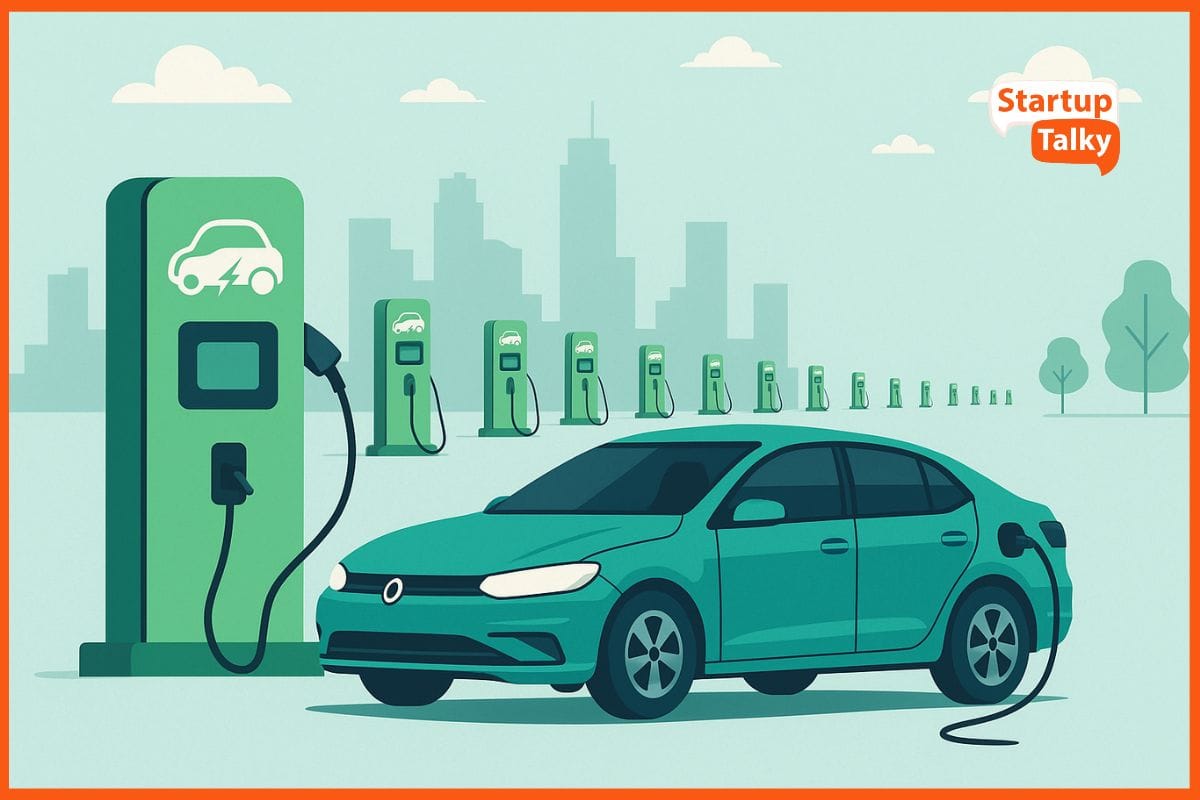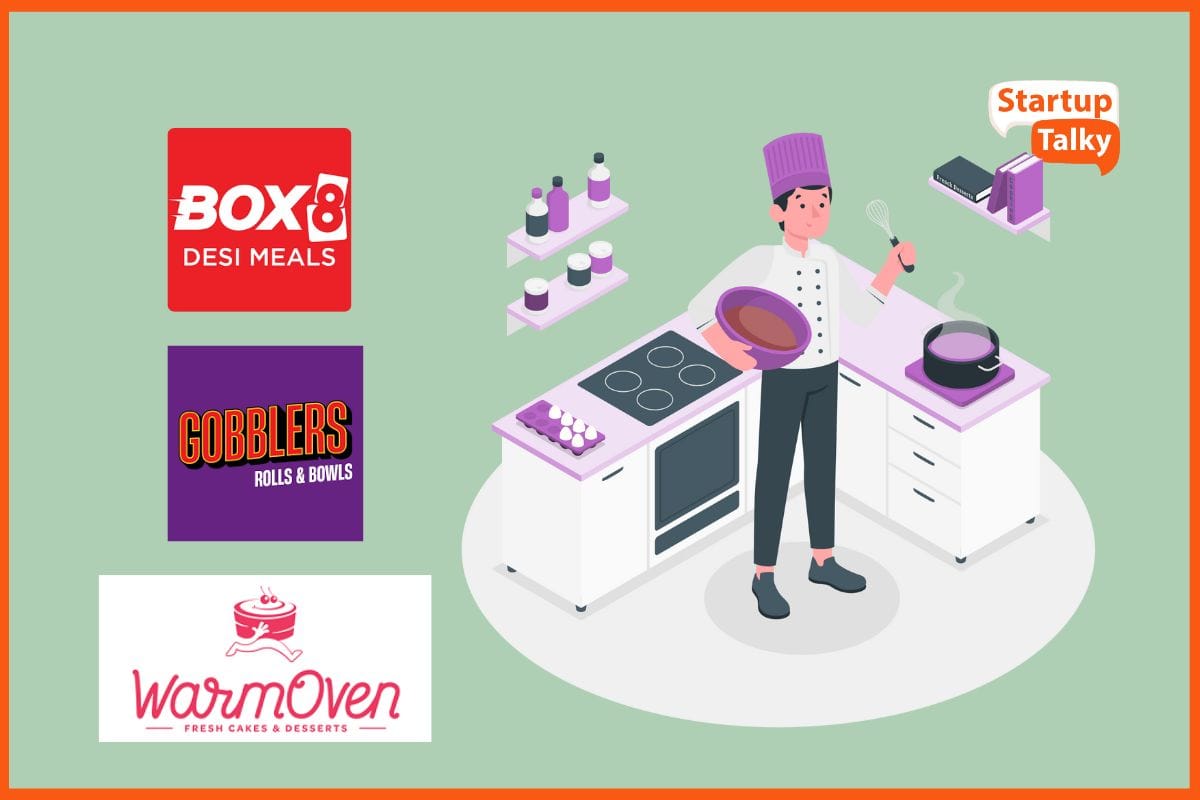
In today’s rapidly shifting Indian economy, two industries are stealing the spotlight: EV (Electric Vehicle) charging stations and cloud kitchens. On one hand, India’s aggressive push toward green mobility, fueled by government incentives and a growing demand for electric vehicles, has opened the gates for EV charging infrastructure. On the other hand, the surge in food delivery culture, amplified by platforms like Swiggy and Zomato, has turned cloud kitchens into a booming business model.
At first glance, both industries offer the ideal mix of innovation and profitability. But the real question is, are these franchises good long-term businesses, or just popular trends that might fade away soon? Let’s decode the opportunities behind these rising franchise models and see if they truly live up to the hype.
Why EV Charging Franchises Are India’s Hottest Business Model?
Why does this matter for entrepreneurs?
Is the EV Franchise Model Sustainable?
Ghost Kitchens Going Mainstream: How Franchises Are Winning with Cloud Kitchens?
Breakdown of Initial Expenditures for a Cloud Kitchen
Future Outlook: Cloud Kitchens — Sustainable Growth or Fading Trend?
Why EV Charging Franchises Are India's Hottest Business Model?
India’s electric vehicle market is witnessing an unprecedented boom. As of April 2025, the country had over 5.91 million EVs on the road. To support this momentum, India needs 1.32 million public chargers by 2030.
According to the report titled "India Electric Vehicle Charging Infrastructure & Battery Swapping Market Overview", the Indian EV charger market is set to grow at a remarkable CAGR of 65% between 2022 and 2030.
This rapid expansion is expected to drive annual sales of nearly 3 million charging units by the end of the decade, aligning with the targets outlined in the National Electric Vehicle (NEV) roadmap for 2030.
 StartupTalkySakshi Jadhav
StartupTalkySakshi Jadhav
Why does this matter for entrepreneurs?
- Government subsidies under the FAME-II scheme: The FAME-II scheme (Faster Adoption and Manufacturing of Hybrid and Electric Vehicles in India – Phase II) was launched in 2019 and initially planned to run until March 2022, but it has been extended multiple times, currently up to March 31, 2025.
- State-level tax rebates and land allotment: Many state governments provide additional benefits like tax exemptions, interest subsidies, and even low-cost land allotments to encourage private players to invest in EV charging infrastructure.
- Growing demand for fast-charging stations on highways and in urban centers: With EV adoption rising rapidly, there’s a strong need for fast-charging stations along national highways, metro cities, and commercial hubs, creating a scalable opportunity for entrepreneurs and franchise investors.
Investment Requirements & ROI
The investment needed to open an EV charging station varies based on location and technology.
|
Charging Station Type |
Power Output |
Charging Time |
Cost Range (INR) |
|
AC Level 1 |
3.3 kW |
6–8 hours |
INR 5,000 – INR 15,000 |
|
AC Level 2 |
3.3 – 22 kW |
2–6 hours |
INR 20,000 – INR 50,000 |
|
DC Fast Charging |
50 – 150 kW |
30–60 minutes |
INR 1,00,000 – INR 3,00,000 |
|
Battery Swapping |
N/A (swap-based) |
2–5 minutes |
INR 50,000 – INR 1,00,000 |
Is the EV Franchise Model Sustainable?
Yes, provided location and uptime are optimised. EV charging stations can be highly profitable when installed at high-footfall or high-traffic locations with a consistent energy supply and minimal downtime. Choosing the right real estate and ensuring charger availability are critical to success.
- Rapid EV adoption: India has crossed over 5.9 million EVs on the road as of 2025, with sales growing exponentially across two-wheelers, cars, and commercial vehicles. This ever-increasing base fuels consistent demand for public charging points.
- Mandatory EV charger installations in malls and commercial buildings: Real estate and urban planning policies in many states now mandate EV chargers in new commercial and residential projects. This creates long-term infrastructure demand and steady traffic to franchise locations.
- Corporate fleet demand (Zomato, Flipkart, Amazongoing electric): Major delivery and logistics companies are electrifying their fleets to cut fuel costs and meet sustainability targets. This drives predictable, high-volume usage at fleet-compatible charging hubs.
However, site selection is critical, and franchisees must account for:
- Electricity supply contracts: Access to reliable, high-load electricity with favourable tariffs is essential. Franchisees must negotiate with DISCOMs and ensure that transformer and metering infrastructure are in place.
- GST implications on charging revenue: Charging services are taxed at 18% GST, which affects margins and billing models. Proper tax compliance and financial planning are key to avoiding revenue leakages.
- Maintenance and tech failures: Chargers require regular software updates, hardware servicing, and real-time monitoring. Poor uptime can lead to lost revenue and customer dissatisfaction, especially at fast-charging stations.
 StartupTalkyVarun Bhardwaj
StartupTalkyVarun Bhardwaj
Ghost Kitchens Going Mainstream: How Franchises Are Winning with Cloud Kitchens?
Market Size & Growth Trends
India’s cloud kitchen market is valued at USD 1.13 billion (2024) and is projected to hit USD 2.84 billion by 2030, growing at a CAGR of 16.7%.
Drivers of this growth include:
- Food Delivery is Now the Norm: The rise of Swiggy, Zomato, and Dunzo has made food delivery more accessible than ever.
- Post-COVID Lifestyle Shifts: Customers now prefer hygienic, single-kitchen operations over dine-in restaurants.
- Cost-Efficiency: Cloud kitchens don’t require high-rent commercial spaces or front-of-house staff.
- Tech-Enabled Scale: Brands can operate multiple virtual brands from one location using data analytics and order-tracking software.
 StartupTalkySakshi Jadhav
StartupTalkySakshi Jadhav
Why Cloud Kitchens Are Booming in Tier 2 and 3 Cities?
As competition peaks and margins shrink in metro cities, the real cloud kitchen revolution is quietly unfolding in Tier 2 and Tier 3 cities. These emerging markets are driving the next big wave of growth in India’s food delivery economy.
What’s fueling this momentum?
- Lower rentals and affordable manpower make it significantly cheaper to set up and run operations compared to metros.
- Less saturation means fewer competitors and more room to capture loyal customers.
- Growing smartphone usage and food delivery app adoption (like Swiggy and Zomato) are transforming consumer behaviour in smaller cities.
- Limited dine-in options make online ordering a default choice, boosting acceptance of delivery-only brands.
Breakdown of Initial Expenditures for a Cloud Kitchen
Monthly Operational Costs
Salaries
- Chef: INR 25,000
- Kitchen Helper: INR 15,000
Total Salary Expense: INR 40,000
- Utility Bills (Electricity, Water, etc.): INR 5,000
- Rent(for a small kitchen in a semi-urban area): INR 20,000
- Miscellaneous Expenses (packaging materials, cleaning supplies, etc.): INR 5,000
Total Monthly Operational Cost: INR 50,000
Reserve Surplus Estimation
To ensure smooth operations during the initial months, it's wise to keep a cash buffer. A 3-month reserve is ideal:
- INR 50,000 (monthly cost) × 3 months = INR 1,50,000
If INR 1.5 lakh feels too steep for your launch budget, you can opt for a slightly leaner reserve of INR 1,00,000, especially if you anticipate sales to ramp up quickly and cover most of your expenses within the first few months.
Future Outlook: Cloud Kitchens — Sustainable Growth or Fading Trend?
Cloud kitchens have proven they’re more than just a pandemic-driven phenomenon. They’re rapidly evolving into a tech-powered business model, driven by AI-based demand forecasting, centralized operations, and multi-brand kitchen ecosystems.
Major players are betting big: Zomato launched its own cloud kitchen vertical, while Swiggy’s Access program enables multiple delivery-only brands to operate from shared kitchen spaces, reducing costs and maximizing efficiency.
Conclusion
The future of Indian business is being written today by two revolutionary models: cloud kitchens and EV charging franchises. Cloud kitchens are revolutionizing the food industry with low setup costs, fast ROI, and surging demand in Tier 2/3 cities. They thrive on digital efficiency and changing consumer habits.
Meanwhile, EV charging franchises are powering India’s green mobility push. Backed by government incentives and soaring EV adoption, they offer strong, long-term returns, especially for location-smart investors. Both models are lean, scalable, and built for the next decade of growth.
 StartupTalkyKinnary Nensee
StartupTalkyKinnary Nensee
FAQs
Are cloud kitchens profitable in Tier 2 and Tier 3 cities?
Yes cloud kitchens are profitable in Tier 2 and Tier 3 cities.
What is the average ROI timeline for an EV charging station franchise?
The average ROI timeline for an EV charging station franchise depends on location, footfall, type of charger, and electricity tariff. Typically, fast-charging stations in urban hubs or along highways can recover investment within 2–3 years, especially with consistent usage from commercial EV fleets.
Are EV charging station franchises a good long-term investment in India?
Yes EV charging station franchises is a good long-term investment in India.
Original Article
(Disclaimer – This post is auto-fetched from publicly available RSS feeds. Original source: Startuptalky. All rights belong to the respective publisher.)